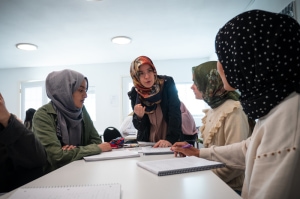Campus Life
A Community of Learning
At Zaytuna College, our students find an abundance of opportunities for personal, intellectual, and spiritual growth. Students enter the College as part of a cohort, a community of learners that travel together through the curriculum, and they are encouraged to study together, teach each other, and reinforce what they’ve learned by reviewing with their peers.
A Center of Faith and Scholarship
Zaytuna’s campus is on Holy Hill, a multi-faith neighborhood that is home to the largest consortium of religious colleges in the nation. The Upper Campus, the home of the undergraduate program, sits on the very top of the hill on a serene ten-acre property; the Lower Campus, is two blocks from the University of California–Berkeley and within walking distance of downtown Berkeley. As a student at Zaytuna College, you also become part of the San Francisco Bay Area, a thriving, bustling center of culture, technology, and academia with a population of seven million people, including a Muslim population of about 250,000, more than fifty mosques, and dozens of Islamic organizations.
Experiential Learning
Zaytuna College aims to foster a holistic environment of learning where inquiry, transmission, and debate take place as a way of life inside and outside the classroom.
Residential Life
Living on campus provides students with the opportunity to continue academic discussions outside of the classroom, and build relationships that will endure beyond graduation.
Honor Code
Honor Code, a statement of six core principles related to personal conduct that clarifies and furthers the principles that regulate behavior both on and off campus.
Information for Parents
Our faculty and administration are committed to be their devoted guides as they nurture what God has already imbued within them—a seed that only requires the right environment to flourish.
Campus Life
What Our Students Say
“For anyone who yearns to nourish their intellect and revive their spirit; this is your opportunity. I have benefited immensely from belonging to 12000 Strong. The members-only book club with President Hamza Yusuf has expanded my heart and mind and awakened in me a love for critical thought anchored in spiritual depth.
The Prophet ﷺ said that the most beloved deeds to Allah are the most consistent ones, even if they are small. As members of 12000 Strong, consistent giving is our investment in a legacy of sacred knowledge, a sadaqa jariyah (ongoing charity) that will outlive us all.
May Allah make our monthly support a means of light in this world and the next. Ameen."
— Sara Baig
“A Zaytuna education addresses how to become a better citizen and human being. This distinguishes Zaytuna College from other North American colleges and universities: students learn that the blessings we are given come with a responsibility to give back. This essential aspect is entirely missing from higher education. Not once in any of the three universities I attended, including law school, did my professors address the responsibility of giving back to community.”
— Hussein Hamdani
“Supporting Zaytuna College becomes more important with each passing day. The work of connecting young Muslims to our rich history and living tradition, and teaching them to think critically and communicate persuasively, has never been more important.
As recipients of revelation and prophetic guidance, Muslims have a heavy responsibility in these challenging times. Humanity needs us to be good stewards of the guidance we have been given. We must become better leaders and followers and deliver to others what has been passed on to us . In every arena — as parents, neighbors, employees, and citizens — it is upon us to model a better way.”
— Zakaria Shaikh



